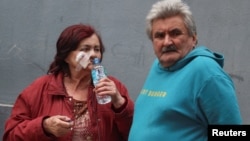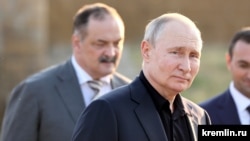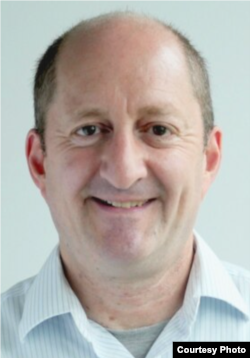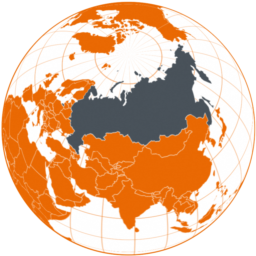
I'm Steve Gutterman, the editor of RFE/RL's Russia/Ukraine/Belarus Desk.
Welcome to The Week In Russia, in which I dissect the key developments in Russian politics and society over the previous week and look at what's ahead. To receive The Week In Russia newsletter in your inbox, click here.
Attacks in Ukraine and Chechnya, horrific but now not unusual, lay bare President Vladimir Putin’s legacy at home and abroad. Meanwhile, two of his most prominent foes languish in prison, one in Russia and one in Georgia.
Here are some of the key developments in Russia over the past week and some of the takeaways going forward.
The Prisoners
There are plenty of differences between Aleksei Navalny and Mikheil Saakashvili, but there are also some striking similarities.
Both are foes of Russian President Vladimir Putin. Both are serving long prison terms following convictions on charges they say were fabricated for political reasons. And both are being tried on additional charges that could keep them behind bars even longer.
If they survive, that is. Both men have suffered serious health problems in prison and say they have been mistreated, denied adequate medical care, and even poisoned by their jailers.
Another similarity is linked closely to the first: While Navalny and Saakashvili have many detractors whose criticism draws on their actions and their words over the years, they represent, for many in Russia, Georgia, and other former Soviet republics who want change, the idea that the political landscape could be different from what it is -- that there must be another choice, another way. The hope, that is, for a nonviolent change of power.
In Georgia, Saakashvili embodied that hope 20 years ago and rode it to the top office, winning the presidency after the Rose Revolution of late 2003 -- massive protests over disputed parliamentary elections and the government of former Soviet Foreign Minister Eduard Shevardnadze, which was seen by many citizens as corrupt, ineffectual, and mired in the Soviet era more than a decade after the U.S.S.R. fell apart.
Saakashvili launched major reforms in the South Caucasus country and sought close ties with the West, portraying Georgia as the cradle of Europe. Over two terms as president, his popularity faded, and he came to be accused of the same crass practices he had stood against. In November 2007, four years after the Rose Revolution, state security forces violently crushed anti-government protests, badly tarnishing his reputation, and further troubles followed.
Peaceful Transfer
Saakashvili appeared no less enamored of power than Putin, say, or Alyaksandr Lukashenka, who has held onto it in Belarus since 1994 by jailing opponents, suppressing protests, and staging votes marred by ample evidence of fraud. But he ceded power to the opposition after his party lost parliamentary elections in 2012, and he stepped down peacefully as president the following year.
That sets Georgia apart from several former Soviet republics -- including Russia.
Putin was appointed prime minister in August 1999 and became acting president when Boris Yeltsin abruptly resigned on the last day of that year, giving his chosen successor a huge edge in the first election he faced, in March 2000. When Putin stepped away from the presidency for four years in 2008, becoming prime minister again, it was a carefully arranged move that left little or no room for chance.
Unlike in Georgia in 2003, Russian government forces cracked down harshly on a wave of protests that were sparked by anger over alleged fraud in parliamentary elections in 2011 and dismay over Putin’s decision to return to the presidency the following year. He started his fourth term in 2018 and -- when faced with constitutional term limits that would have made this one his last -- he changed the constitution, pushing amendments through in a vote that was also marred by evidence of fraud.
Navalny was one of the leaders of the protests that erupted in 2011 and contends that his repeated prosecutions -- not to mention a weapons-grade nerve-agent attack that nearly killed him in 2020 -- are aimed at thwarting his efforts to challenge Putin in elections. He was barred from the ballot in 2018, and the extensive political network he established to support his campaign, which was banned before it officially began, has been destroyed and outlawed by the state. He is now being tried in prison on extremism charges.
Of course, while Navalny is probably Putin’s most prominent opponent, it’s impossible to know what the results of a free and fair presidential election in Russia would bring. It’s also impossible to know how much Russia would differ under Navalny -- or almost anyone else who might come to power, for that matter -- both domestically and in terms of foreign policy.
Prigozhin's Rebellion
After all, perhaps the greatest challenge to Putin’s grip on power in nearly 24 years as president or prime minister occurred just last month -- and it came from Wagner mercenary group leader Yevgeny Prigozhin, for whom violence appears to be a way of life, or at least a frequent means to whatever end he is pursuing on any given day.
As for Ukraine, Prigozhin has advocated an even more aggressive pursuit of the war against Ukraine, despite suggesting on the eve of his mutiny that one of the main narratives Putin has used to justify the full-scale invasion of February 2022 -- the claim of an imminent threat from NATO and Ukraine -- was false.
Still, it is Putin, for example, who put Ramzan Kadyrov in charge of Chechnya, where human rights activists say he rules through violence and fear, fostering an atmosphere of impunity for abuses by security forces in order to maintain control of the restive region in Russia’s North Caucasus.
Amid the daily atrocities of the war in Ukraine, an incident in Chechnya this week underscored Kadyrov’s method of rule -- and therefore Putin’s, because he cannot or will not rein the regional leader in and, in any case, has shown no inclination to try.
Yelena Milashina, an award-winning journalist who has doggedly reported on abuses in Chechnya, was severely beaten by attackers while en route from Chechnya’s main airport to the capital, Grozny, on July 4. A lawyer she was traveling with, Aleksandr Nemov, was also attacked.
Putin's Appointee
Milashina and Nemov were on their way to a courthouse to attend the verdict hearing in the trial of Zarema Musayeva, the mother of three Chechen opposition activists who have fled Russia in the face of harassment and threats by Chechen authorities over their online criticism of Kadyrov.
Kadyrov and several allies, including a member of the Russian parliament, have publicly vowed to kill brothers Ibragim, Abubakar, and Baisangur Yangulbayev, as well as all members of their family, calling them "terrorists."
Hours after the attack on Milashina and Nemov, the court convicted Musayeva of fraud and assaulting a law enforcement officer -- charges critics said were outrageous and politically motivated -- and sentenced her to 5 1/2 years in prison.
Meanwhile, every attack Russia launches against Ukraine, in a war that is motivated in part by Putin’s personal vagaries, bogus historical assertions, and apparent obsession with controlling or obliterating the independent nation next door, once again raises the question of how different things might be today if democracy had progressed steadily in Russia over the decades since the Soviet collapse of 1991, when Moscow accepted it sovereignty and its borders without condition, instead of backsliding badly under Putin.
And in Ukraine, where the full-scale invasion reaches its 500th day this weekend and Kyiv’s forces push ahead with a crucial counteroffensive in the east and south, there is no letup in the Russian attacks and no place in the country where civilians are safe.
Hours before dawn on July 6, Russia targeted the western city of Lviv, hundreds of kilometers from the front lines, with a barrage of missiles apparently fired from warships on the Black Sea.
At least 10 people were killed when an apartment building was hit, destroying the roof and top two stories and creating a terrible but familiar sight: rescue workers digging through rubble to search for survivors and the dead.
'Sing Loudly Of Life'
On the evening of June 27, a similar scene played out much further east, closer to Russia and to the front. A Russian rocket attack hit a busy pizza restaurant in the city of Kramatorsk in the Donbas, where the war began -- fueled by Russian efforts to stoke separatism following the downfall of Moscow-friendly President Viktor Yanukovych -- eight years before the invasion of 2022.
Among the 13 civilians killed in Kramatorsk were twin sisters Yulia and Anna Aksenchenko. Born in September 2008, they were starting the 15th summer of their lives.
One of the victims survived until July 1: Viktoria Amelina, 37, an award-winning author from Lviv and an activist who had been documenting evidence of crimes by Russian forces since the invasion. She was at a restaurant in Kramatorsk with a group of Colombian writers and journalists when Russia launched the attack.
Amelina “was writing a book on women's experiences of the war,” according to Uilleam Blacker, a British-based scholar who is a translator of Ukrainian literature.
“Another Ukrainian book that will never be finished because of Russian bombs and bullets,” Blacker wrote in a Twitter post. It included his translation of her Poem About A Crow, which he said was inspired by her work interviewing women who have lived through Russian occupation in Ukraine.
One stanza reads like this:
She’ll cry each name into the ground,
As though sowing the field with pain,
From pain and the names of the women,
New sisters will grow from the earth,
And, again, will sing loudly of life.
That's it from me this week.
If you want to know more, catch up on my podcast The Week Ahead In Russia, out every Monday, here on our site or wherever you get your podcasts (Apple Podcasts, Google Podcasts, Spotify, Pocket Casts).
Yours,
Steve Gutterman






